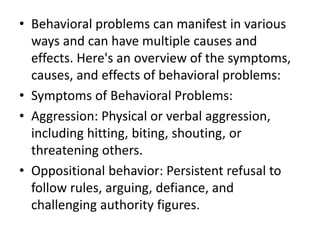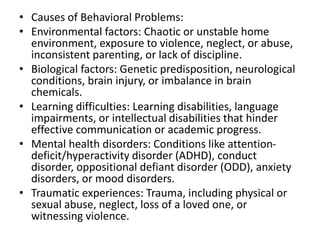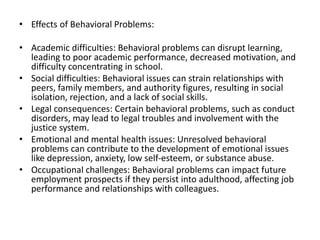Types of Behavioural Problems Symptoms, Causes and.pptx
- 1. Types of Behavioural Problems Symptoms, Causes and Effects
- 2. • Behavioral problems can manifest in various ways and can have multiple causes and effects. Here's an overview of the symptoms, causes, and effects of behavioral problems: • Symptoms of Behavioral Problems: • Aggression: Physical or verbal aggression, including hitting, biting, shouting, or threatening others. • Oppositional behavior: Persistent refusal to follow rules, arguing, defiance, and challenging authority figures.
- 3. • Hyperactivity: Excessive restlessness, impulsivity, and difficulty staying focused or sitting still. • Withdrawal: Social isolation, reluctance to participate in activities, and lack of interest in interacting with others. • Conduct problems: Frequent lying, stealing, vandalism, or other behaviors that violate social norms or laws. • Emotional instability: Frequent mood swings, irritability, anger outbursts, or emotional volatility.
- 4. • Causes of Behavioral Problems: • Environmental factors: Chaotic or unstable home environment, exposure to violence, neglect, or abuse, inconsistent parenting, or lack of discipline. • Biological factors: Genetic predisposition, neurological conditions, brain injury, or imbalance in brain chemicals. • Learning difficulties: Learning disabilities, language impairments, or intellectual disabilities that hinder effective communication or academic progress. • Mental health disorders: Conditions like attention- deficit/hyperactivity disorder (ADHD), conduct disorder, oppositional defiant disorder (ODD), anxiety disorders, or mood disorders. • Traumatic experiences: Trauma, including physical or sexual abuse, neglect, loss of a loved one, or witnessing violence.
- 5. • Effects of Behavioral Problems: • Academic difficulties: Behavioral problems can disrupt learning, leading to poor academic performance, decreased motivation, and difficulty concentrating in school. • Social difficulties: Behavioral issues can strain relationships with peers, family members, and authority figures, resulting in social isolation, rejection, and a lack of social skills. • Legal consequences: Certain behavioral problems, such as conduct disorders, may lead to legal troubles and involvement with the justice system. • Emotional and mental health issues: Unresolved behavioral problems can contribute to the development of emotional issues like depression, anxiety, low self-esteem, or substance abuse. • Occupational challenges: Behavioral problems can impact future employment prospects if they persist into adulthood, affecting job performance and relationships with colleagues.
- 6. • It's important to note that each individual is unique, and the symptoms, causes, and effects of behavioral problems can vary greatly. Seeking professional help from psychologists, psychiatrists, or other mental health professionals is crucial for accurate diagnosis, treatment planning, and intervention strategies tailored to the individual's specific needs. • Dr. S.V. Prasad of Manovikas is best counselling for behavioral problems, He is offering family conflict counselling services, anxiety disorder therapy, relationship problems, depression, stress relief, phobias and fears treatment and overcoming negative thinking.





